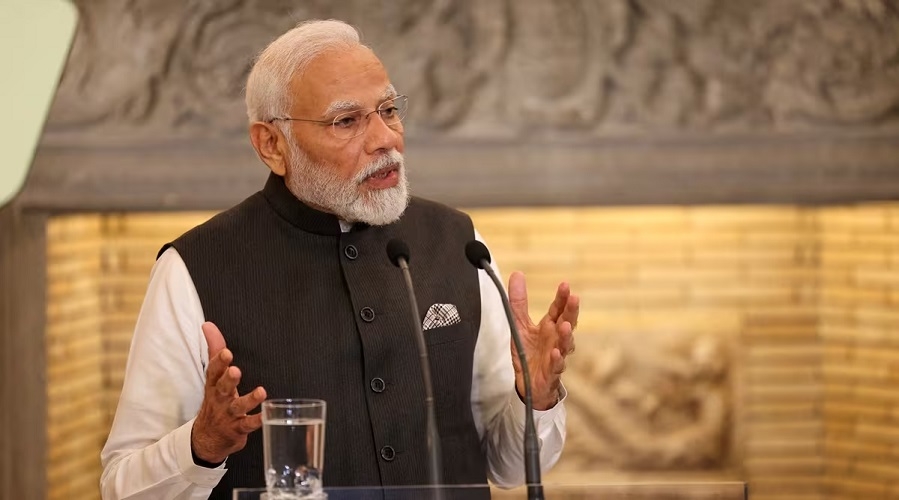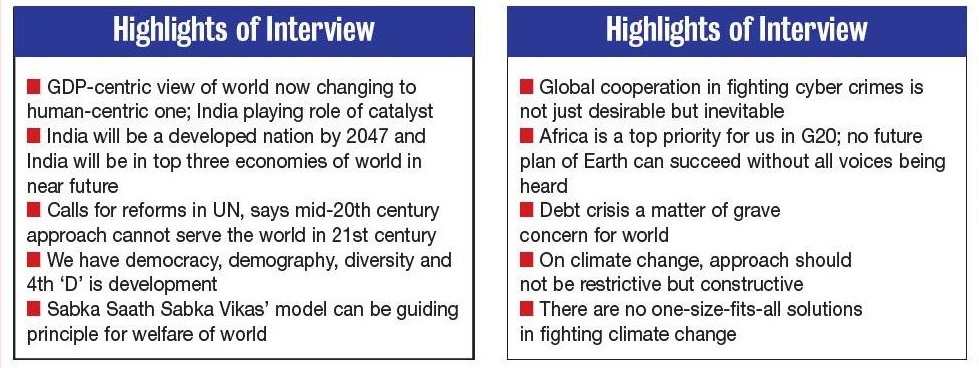‘Every voice matters’, asserts PM Modi
04 Sep 2023 06:58:00

By Vijay Joshi :
NEW DELHI

“I had the privilege of witnessing first-hand the feats common citizens were capable of when given a platform and an opportunity.”
A WEEK before he hosts world leaders at the G20 summit, Prime Minister Narendra Modi has asserted that the ‘Sabka Saath Sabka Vikas’ model can be the guiding principle for the welfare of a world shifting from a “GDP-centric approach” to a “human-centric one”.
“Irrespective of the size of the GDP, every voice matters,” Modi told PTI in an exclusive interview late last week at his Lok Kalyan Marg residence.
US President Joe Biden, Japanese Prime Minister Fumio Kishida, British Prime Minister Rishi Sunak, Saudi Arabia’s King Mohammed bin Salman and other leaders will gather at the newly-constructed Bharat Mandapam conference hall on September 9-10 for the pre-eminent annual meeting of developing and developed countries.
“Many positive impacts are coming out of India’s G20 Presidency. Some of them are very close to my heart,” Modi said in the 80-minute interview, focused on G20 and related issues, with three senior staff of PTI including Editor-in-Chief Vijay Joshi.
G20 accounts for 85 per cent of the global GDP, 75 per cent of international trade and 65 per cent of the world population. India took over the G-20’s presidency from Indonesia last November, and will hand over to Brazil in December.
Modi said that while it is true G20 is an influential grouping in terms of its combined economic might, “a GDP-centric view of the world is now changing to a human-centric one”, and just as a new world order was seen after World War 2, a new world order is taking shape post-COVID.
“The shift to a human-centric approach has begun globally and we are playing the role of a catalyst. India’s G20 Presidency has also sowed the seeds of confidence in the countries of the so-called Third World,” he said.
“The Sabka Saath Sabka Vikas model that has shown the way in India can also be a guiding principle for the welfare of the world.”
While the interview was meant to be focused on G20, Modi also spoke about India’s economic progress, its growing stature on the world stage, cyber-security, debt trap, bio-fuel policy, UN reforms, climate change and his vision of what India will be like in 2047.
“For a long time, India was perceived as a nation of over one billion hungry stomachs. But now, India is being seen as a nation of over one billion aspirational minds, more than two billion skilled hands, and hundreds of millions of young people,” Modi said.
“The period till 2047 is a huge opportunity. Indians who are living in this era have a great chance to lay a foundation for growth that will be remembered for the next 1,000 years!” he added.
“By 2047, I am sure that our country will be among the developed countries.
Our poor people will comprehensively win the battle against poverty. Health, education and social sector outcomes will be among the best in the world. Corruption, casteism and communalism will have no place in our national life,” he said.
G20 was born at the end of the last century when the major economies of the world got together with a vision of a collective and coordinated response to economic crises. Its salience grew even more during the global economic crisis in the first decade of the 21st century.
But when the COVID pandemic struck, the world understood that in addition to the economic challenges, there were also other important and immediate challenges impacting humanity, Modi said.
By this time, the Prime Minister said, the world was already taking note of “India’s human-centric model of development” in economic growth, technological progress, institutional delivery and social infrastructure.
“There was greater awareness of these massive strides being taken by India. It was acknowledged that the country which used to be seen just as a large market had become
a part of the solutions to the global challenges,” he said.
“By the time India became the president of G20, our words and vision for the world were not being taken merely as ideas but as a roadmap for the future.”
In a new dimension to the G20, its ministerial and other meetings were held not just in the capital New Delhi but in all parts of the country, including second and third-tier cities such as Indore and Varanasi. More than one lakh delegates met for some 200 sectoral meetings, many in tourist destinations such as Hampi, Kerala, Goa and Kashmir.
“They have been going to different regions, witnessing our demography, democracy and diversity. They are also seeing how a fourth D, development, has been empowering the people over the last decade. There is a growing understanding that many of the solutions that the world needs are already being successfully implemented in our country, with speed and scale,” Modi said.
While answering a question about the global debt crisis -- which he noted is “a matter of great concern, especially (for) developing countries” -- Modi took a dig at freebies given by some State Governments in India, and stressed on the need for financial discipline.
“Populism may give political results in the short term but will extract a great social and economic price in the long term. Those who suffer the consequences the most are often the poorest and the most vulnerable,” he said.
The Prime Minister also made a strong pitch for United Nations reforms in line with the changing realities of the world and to ensure representation of voices that matter, saying a mid-20th century approach cannot serve the world in the 21st century.
Modi also said that India backs inclusion of the African Union as a full member of the G20 as no plan for the future of the planet can be successful without the representation and recognition of all voices.
Debt crisis is a matter of great concern for the world, especially developing countries, Prime Minister Narendra Modi has said, as India looks at building consensus at the upcoming G20 summit to evolve a tangible framework to help the debt-ridden low income economies. Modi said India’s G20 presidency has placed a significant emphasis on addressing the global challenges posed by debt vulnerabilities, especially for nations in the Global South.
India’s proposal for a global alliance on biofuels among members of the Group of 20 major economies will help accelerate sustainable biofuels deployment in support of the global energy transition, Prime Minister Narendra Modi has said.
The biofuels alliance, which the world’s third biggest oil consumer wants to push during its G20 presidency, mirrors the International Solar Alliance (ISA) piloted by New Delhi and Paris in 2015 to bring clean and affordable solar energy within the reach of all. India backs inclusion of the African Union as a full member of the Group of 20 largest economies as no plan for the future of the planet can be successful without the representation and recognition of all voices, Prime Minister Narendra Modi has said, days ahead of the annual summit of the influential bloc.
Modi has made a strong pitch for altering the approach on climate talks, from restrictive to constructive, and urged nations not to focus on “don’t do this or that”. Modi said there was no “one-size-fits-all” solution to fight climate change. The PM said India has left no stone unturned in meeting its climate goals despite accounting for less than five per cent of the cumulative emissions.
Modi said he had always had a great belief in people as he cited his organisational background to assert that he learnt a lot from many experiences during that phase of his life.
“I had the privilege of witnessing first-hand the feats common citizens were capable of when given a platform and an opportunity,” the Prime Minister said.
Moreover, each State is also ensuring that they leave their unique cultural stamp on the minds of G20 delegates. This is also giving the world an idea of India’s incredible diversity, Modi said. Modi has said it is natural for India to hold G20 meetings in every part of its territory as he dismissed Chinese objections over some of the events being organised in Kashmir and Arunachal Pradesh. As part of its efforts to showcase India’s cultural and regional diversity at a global stage, the Modi government has hosted G20 events across the country’s length and breadth.